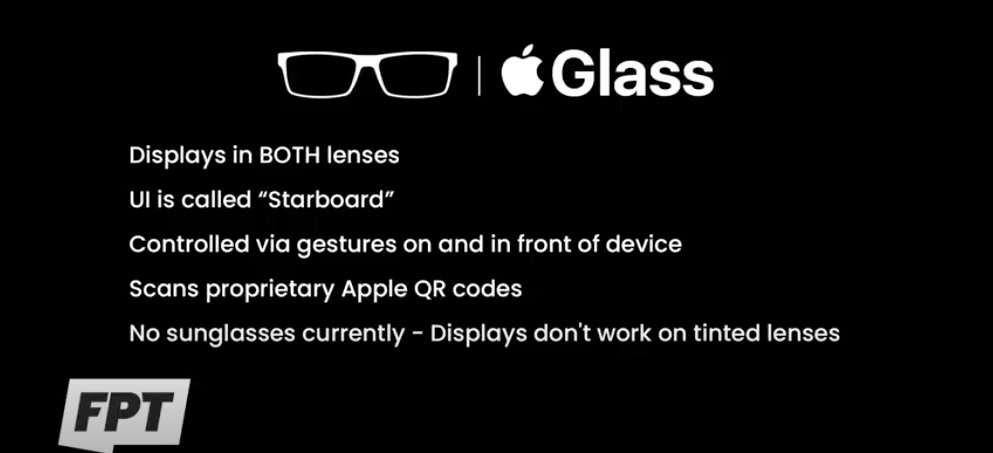Apple will fight a series of battles in a long war: the battle for your eyes. @jon_prosser @markgurman @Scobleizer
#AugmentedReality #AR #VR #MagicLeap #Apple https://shodu.net/apple-vs-oakley-winning-the-battle-vs-winning-the-war/">https://shodu.net/apple-vs-...
#AugmentedReality #AR #VR #MagicLeap #Apple https://shodu.net/apple-vs-oakley-winning-the-battle-vs-winning-the-war/">https://shodu.net/apple-vs-...
A response to yet another seminal post by @Scobleizer in which he positions Apple against Oakley /2 https://www.linkedin.com/pulse/how-apple-glasses-judged-vs-oakley-robert-scoble/">https://www.linkedin.com/pulse/how...
TL;DR I agree with most of his points (although he knows way more than I do about how far along they might be with & #39;true AR& #39; in Apple Glass) /3
Scoble is basically saying Apple can& #39;t let its customers down: that buying eye glasses is a super hard market, and companies like Oakley show how complex it is. That when you go to buy glasses, you& #39;ve already been & #39;locked in& #39; at the optometrist, that & #39;vision& #39; is complex. /4
I don& #39;t just want glasses. I want glasses with protective coatings or progressive lenses, that work on the ski slope and while I& #39;m driving. That won& #39;t break if I nap on top of them :) /5
And he& #39;s right. The end game here is for the glasses market NOT for "AR glasses". He has some amazing use cases for what glasses can do even if they DON& #39;T show much "rich AR" content, using JUST a bit of LiDAR say and a dash of SIRI /6
This falls in with my view that they won& #39;t actually DO much AR. /7 https://shodu.net/apple-doesnt-care-about-augmented-reality-heres-why/">https://shodu.net/apple-doe...
And my other view which is that we here on Twitter (and in & #39;tech land& #39;) keep talking about AR like it& #39;s a THING. Most consumers don& #39;t KNOW that they& #39;re DOING AR when they use a Snapchat filter. There will be NO killer app for AR /8 https://shodu.net/augmented-reality-and-the-killer-app-replayability-and-platforms/">https://shodu.net/augmented...
The REAL battle here isn& #39;t for AR. It& #39;s for spatial computing: a planet-scale interface and operating system. The REAL world. The digital twin. It isn& #39;t AR, it& #39;s self-driving cars and the Kitty Hawk flying car. /9
But even if we& #39;re talking about AR we& #39;re talking here about PHYSICS. About what is IPD and what trade-offs do we need to make with the eye box? About how much light we allow in to our view and how it affects display brightness. /10
Now combine this with all of the issues your optometrist is looking for. Near and far-sighted, how and where you use your glasses, how thick the lens needs to be. /11
(Side note, the Prosser leak included the claim that Apple didn& #39;t SOLVE tinted glasses, which is super weird. AR display works better with tinted glasses. But it& #39;s an important insight for my next points) /12
All of this is to say that ANYONE entering the glass wearable market has a ton of trade-offs to consider. And that THOSE tradeoffs then need to recognize that Oakley won& #39;t just sit still, that the benchmark isn& #39;t just Oakley glasses /13
The benchmark is an end-to-end user experience. And Scoble is saying that Apple needs to solve this. And he& #39;s right/ BUT.... /14
It doesn& #39;t need to solve it all at once. When I think Apple I don& #39;t think BIG moments: the iPhone, the iPad, the Watch. I think of all of the incredibly incremental things they do. Their SUCCESS is their incrementalism. Their SUCCESS is what they do NOT do /15
All of those features pulled at the last minute before launch. The lessons learned from Maps and from that antenna gate thing. "Don& #39;t do it if it doesn& #39;t work perfectly, we can always get to it later" /16
And so in the end, Apple vs Oakley. But not necessarily right away. It& #39;s a LONG campaign. /17
If Prosser is right, for example, the $500 price point doesn& #39;t suggest REPLACING your current glasses. It represents supplementing them. /18
What I THINK Apple might do is take a much slower, patient approach. Gradually encroach on the glass industry in the same way they did Watch. They didn& #39;t tackle luxury right away, they waited. And so Glass might be the same: "this year we are proud to announce sports glasses" /19
"This year we& #39;re proud to launch our luxury line" etc. So while I don& #39;t differ with Robert, where I might differ is in timing. When does Apple "take on" Oakley? And remember, they& #39;re "taking on" not a pair of glasses but an entire user journey... /20

 Read on Twitter
Read on Twitter


